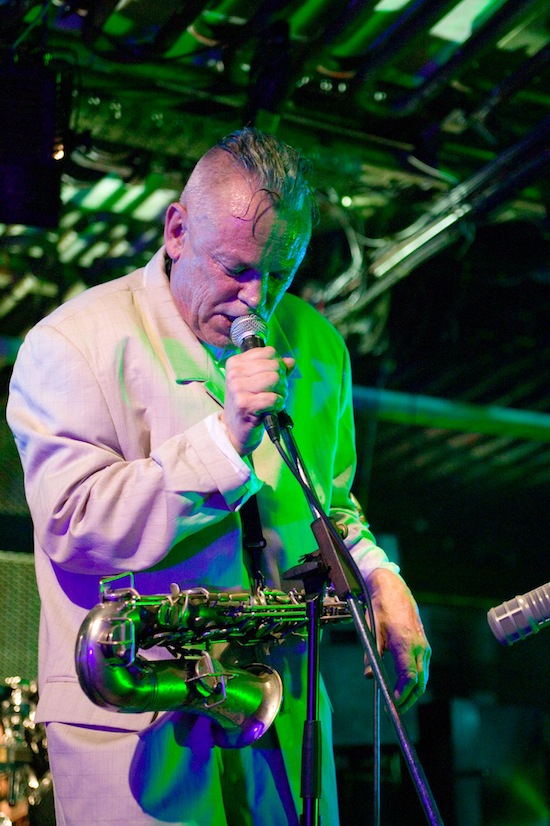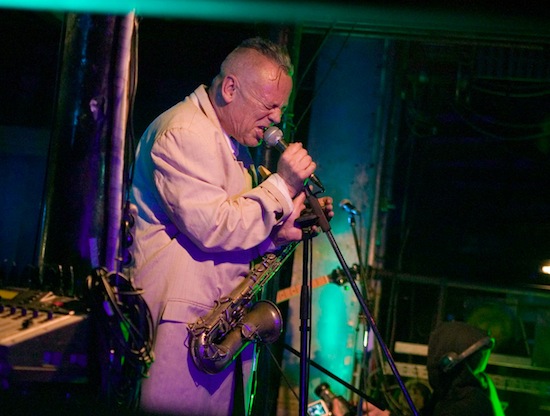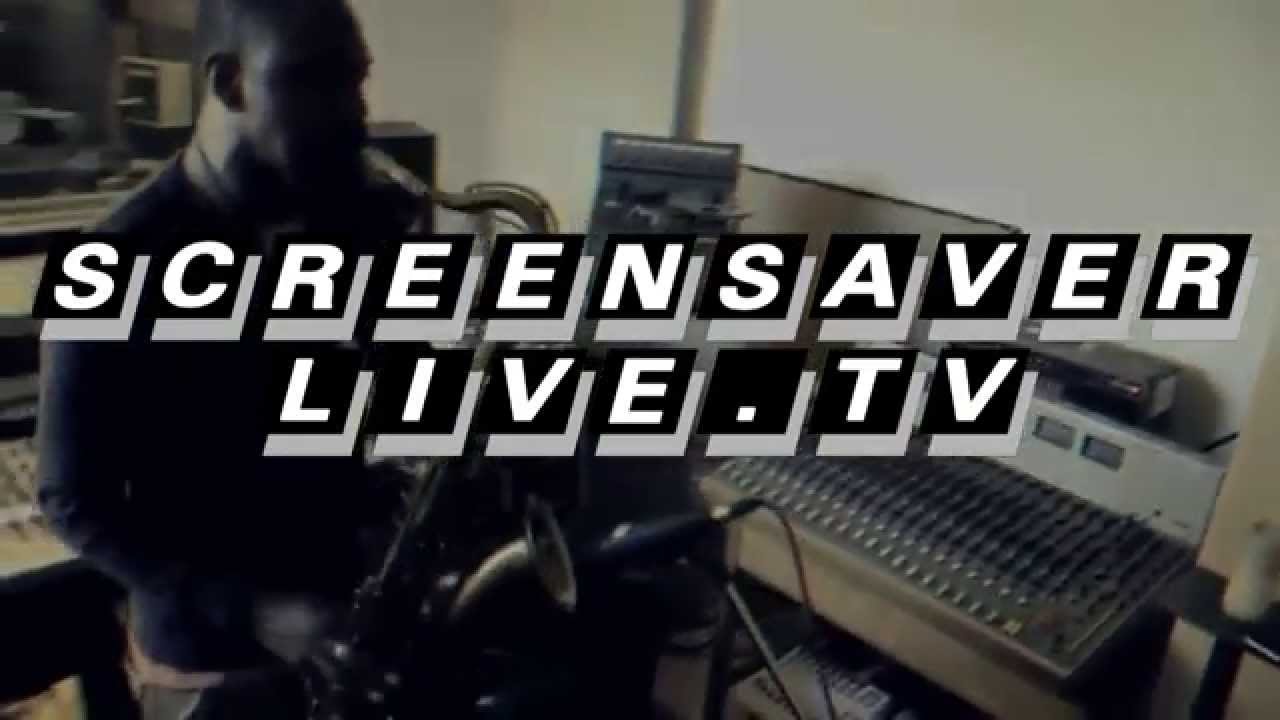The English poet, puppeteer, provocateur and musician Ted Milton is best known for his experimental art rock group Blurt, who were founded in 1979 in Stroud, Gloucestershire. As one of the early Factory records signings, they shared bills with the likes of Joy Division and A Certain Ratio before offending Tony Wilson by comparing the label to the lifestyle-chain Habitat. Also championed at the time by John Peel, the band have been through a number of lineup changes but never really went away, and continued to release albums and singles on a number of different labels, the most recent being 2010’s Cut It! Now in his early 70s, Milton remains a compelling and energetic performer with a unique perspective on the history he has lived through. Ahead of their Saturday night gig with Shabaka Hutchings’ (of Sons of Kemet fame) new group The Comet is Coming and Myriad Forest, at the Total Refreshment Centre in Dalston, I caught up with him at his studio in Deptford.
I know you started out as a poet before deciding to pick up a sax, did you have any original poetic influences? I mean what was it that led you towards that?
Ted Milton: Well, I started writing poetry as kind of way of avoiding doing something else. Basically, I didn’t want to do any homework… or anything to do with school at all. So I sort of found myself writing this sort of whimsical shit, which was in stanza form and therefore poetry. I think I was about 11 or 12 and one or two bits of English poetry began to get to me, in spite of it all. I think the English teacher had something about him… you know, I didn’t resist him as much as all of the other teachers. I think he did manage to impart something of what could be found in literature. Then when I got to be 15 or 16, then of course I fell under the influence of the beats, Ginsberg and Kerouac and all of that. And then I discovered the Russians, [Andrey] Voznesensky and [Vladimir] Mayakovsky and these people… and that blew me away totally. And then of course, at the time in Liverpool they used to do shows with [Roger] McGough and [Brian] Patten, [Michael] Horowitz and on the odd occasion Pete Brown.
I totally identify with what you are saying about not really accepting the stuff you were supposed to be interested in at school. About needing to find your own interests…
TM: For me, I was a little colonial brat. By the time I was 11 I’d spent equal numbers of years in Canada, Africa and England, in innumerable little institutions and after that I had three secondary schools and I was expelled from each one of them. Not for doing anything that interesting, or violent – as is fashionable today. For some reason I just resisted the whole thing. I can’t be dissuaded from my prejudice that the whole of the educational system is geared towards making people stupid. You know, to go through hoops… to be taught not to think. By and large you know, and there’s got to be a lot of exceptions, I think by and large that’s what’s going on. That’s why there’s this whole massive generation of disaffected, empty youth… who express themselves with shiny pointed things. It’s like Pavlov said, the rats which are the most confused little monsters are the most easy to control.
Talking of puppets… how did you start working with them?
TM: Yeah, that’s weird. In the 60s, at that time I was living in Long Acre and people were getting really pissed off with me sort of sponging all the time. You know, ‘I’m a poet, so you can buy the next round.’ One day I saw an advertisement saying that someone was needed to work in a puppet theatre. So I applied and got the gig and went up to Wolverhampton and found myself working for this marionette company with metre high, hard wood carved, really heavy marionettes, sort of back breaking stuff, Hansel and Gretel, the Lost Princess and stuff. But there was something about it that really fascinated me, so I started making lots of drawings and I came away after a year or two and built my own theatre and marionettes and I opened up for a season on the west pier in Brighton. Then I moved into other forms… glove and mixed media stuff and did that for about 15 years. I was much more successful doing that then I’ve ever been with music…
So this was before Blurt?
TM: Yeah, I mean, I packed the Roundhouse doing a one man show… but I got more and more frustrated with the public and my shows got more and more unpleasant and aggressive. The Blue Show was sort of gratuitously nasty and designed to empty seats, which it did. I was invited up to Sheffield, to the Crucible, where they had three plays in rotation and one of them was a Dennis Potter play…
Was it Brimstone And Treacle?
TM: I don’t know… but what happens is that you see this brain damaged girl getting shagged onstage…
That’s Brimstone And Treacle… She’s getting raped by the devil – which rather perversely is what brings her out of her coma.
TM: Me, I was really offended by that frankly… but the audience seemed to think that was fine. And every night you’d get two different plays and my puppeteer sequence, as the Blue Show, was one of them. So then, they’d get their diaries out and stuff and read them whilst the set was being changed and I’d start my puppet show. Then you’d get to this point in the puppet show where… after Inspector Deep Throat Porker had been nasally impaled by Constable Parker and vomited wet-look Union Jacks, they’d get up and leave, because I knew where to hit ’em.
They found that worse than the comatose girl being raped by the devil…
TM: Yeah. And you know, this guy came up to me at the time, he was my accountant because I had an accountant at the time as I was making money and he was also on the committee of the Crucible and he said to me: ‘Ted, how can you treat people like that?’ And I felt so gratified [laughs]. I had a great big workshop at the time, I was living in Stroud in Gloucester and I’d be cooking up all these different scenarios and was obsessed with the whole thing. You see, if you read Jarry [Alfred Jarry, the creator of Ubu Roi and an early precursor to the surrealist movement] I think you’ll find that probably his writings about theatre are more interesting than his theatre. And, you know, Ubu Roi was first performed with puppets… he hated actors, because as you will have noticed, and as he wrote down, actors betray the author’s intention because they crave applause. Also, because of the eye contact, the audiences maintain their defences, which is where that expression the suspension of disbelief comes in. But you see, with marionettes, the eyes are dead and therefore people become vulnerable and I realised all of that. I really went down that road big time until I got to an impasse where to me, it was just war. And anybody by definition, who wanted to come to a puppet show, I just wanted to upset. So that just kind of came to an end and that’s when I got into the so-called music thing, because in a way I’d been inside a box all this time and it was great to come out of that and let it flow. It was a great kind of cathartic release for me. I’d just been winding myself up more and more…
When you decided to start a band, where there any other bands that you saw that inspired you to do that?
TM: I hardly saw any bands at all really, although I realised recently watching a 1964 Howling Wolf performance at Birmingham, which is so great. You’ve gotta see this… it’s just the intensity of the guy’s performance, just blows you away. I never saw a huge amount of live music, but I always listened to a lot of music. At the time, when I formed the band, I was listening to some rock & roll, Chicago blues, bebop… I was very much into Bartok. We played in Budapest before the wall came down and we had so much money, I went and bought all the vinyl I could literally carry and most of it was Bartok stuff, versions by the Hungarian state orchestra… And also, you know, I’m mad about North African music…
So the jazz influence wasn’t so strong?
TM: Well, I was mad into Ornette. I think I was much more influenced by him then than I am now…
Was that behind the decision to pick up a sax?
TM: Not really. I tell you what happened was simply that a good friend of mine dropped by the house one afternoon and in the course of conversation said: ‘I’m selling my sax.’ And I dunno why, but I said, well let’s have a look at it. Because I knew I was trying to find a way out from the puppetry. And I looked at it and said, do you mind leaving it for a couple of days.. and that was it.

How long did it take you to get a reasonable sound out of it?
TM: Well… very fast. I started performing with it within a couple of months and I had been playing for such a short length of time that my embouchure just crashed… and I couldn’t play after about 20 minutes, because my lip just gave way. But the range of tones and approaches you can get out of a sax, simply because of the myriad variables, in the reed and the mouthpiece… The gig we’re playing on Saturday night, the guy said, you know its an improv night so you can loosen up. And I thought well, if you want an improv band, get an improv band along. My personal response to that very well intentioned remark is to make it as tight and as harsh and as attacking as possible. Blurt in any case, is very kind of powerful rhythmically and that is what the band’s about… and then also what it’s about is all the variations that take place on top of that in terms of the vocal sound and the saxophone sound, that is often very extremely improvised…
The times I’ve seen you play, you get a really great response from young audiences, which I think is a fantastic vindication of what you do. That’s because of the fact that it is so strong rhythmically, that it is danceable…
TM: Exactly. I mean, I think the guys who are on with us on Saturday night, listening to a little fragment of what they do, have sussed that as well.
Certainly Sons of Kemet, which is Shabaka Hutching’s other band have done that. I mean, to see someone playing a Tuba of all things and getting this kind of response…
TM: When we tour, it seems to go two ways. For example one of the shows we played in Frankfurt recently, the guy who promotes it loves the band, he’s been putting it on for 20 years… but the audience come in, and there’s a couple less each year and many of them are on zimmer frames and many of them bring well-creased albums from the 80s up to me for me to sign… but its ok. On the other hand, we played at a festival in Provence a couple of months ago and we played to very nearly 1,000 people and there were people there that were there for us for sure, maybe even as many as 100 but.. we tore the place down, people were screaming and shouting, people were dancing and I know that we can connect with the people that go out now, who as it happens are younger…
Did you ever see yourself as a new wave or a post-punk band at the time?
TM: I’m not really sure what new wave means… ah no wave, new wave… like those American people James Chance and the Contortions. When we first had a record out and a reviewer mentioned James Chance and also mentioned Captain Beefheart, neither of whom I had heard of, I went down to the record shop and listened to them and thought, fuck, that’s a drag – because I could see the connection straight away.
But you liked them?
TM: Yeah, I liked James Chance and Beefheart very much… but certainly as the years have gone by, we’ve gone further and further away from sounding anything like them…
I think the main similarity with James Chance is his sharing the desire to break through the audiences being too staid, you know, wanting to provoke a reaction…
TM: And I could never really understand why people said we had anything to do with punk and at the time I never liked punk music at all. But now I’ve started to see at as more of an attitude, and I realise that yeah, perhaps we were punk in that respect.
For me, I’ve always been more interested in post-punk. Stuff like Pere Ubu or Public Image Ltd.
TM: I just love Metal Box. Lydon is just amazing… some of that stuff is so emotional, his voice is so keening, like you’d hear in some sort of Egyptian music or something, just amazing, the intensity of it… I really, really dig it.
Do you have any particular memories of playing with those other Factory bands?
TM: Only a bit… I mean Joy Division. Again, they’re a band that I started listening to again, only a couple of nights ago I came across one of their tracks, the one with the line "When we were young"… it almost makes me cry to think about it. You know the one I mean?
I think it’s called ‘Insight’.
TM: Yeah, that’s the one. I was fighting back the tears listening to it. The thing is, at the time I was so up myself that I just thought that nobody could come near what we were doing and I wasn’t remotely interested in the other bands. I mean, when we were doing those shows with Joy Division and A Certain Ratio and stuff, I barely bothered to listen to them. As years have gone by I’ve started to listen back to some of that stuff and realise that some of it is goddamn awesome and I’m coming to be a Joy Division fan.
Do you feel that the experience of playing live has changed much from those days? The way that you are treated as artists?
TM: Oh god yeah, the climate is really different. Say four or five years ago we played in Bucharest and the reaction of the audience was kind of similar to when we started playing in the early 80s. They come to it fresh from having been deprived and listen to it more acutely… everything here is… well, there’s hardly any energy to be found anywhere. Nobody wants to pay a dime for it, they want to get in for free. Performance is just a means to getting a record deal.
I’ve seen people watch an entire gig through their iPad…
TM: I know! For example, if you say people have watched something like 500,000 murders on the TV in their life and then they see something happening in front of them… there are kind of filters between you and real experience and some kind of immediacy seems to have disappeared… maybe its just me being slightly jaded or something (laughs).
Finally… and this is a silly question next. Do you remember who Frank Sidebottom was? The guy with the weird papier mache head?
TM: Yeah, I remember the name…
He was a cult musical comedy act. But somebody now has made this into a film starring Michael Fassbender in a papier mache head and its being described as a biopic of an avant-garde band. So I was wondering, given that someone would make a film out of something like that, could you one day envisage a Blurt biopic and who would you like to play you?
TM: Well, I think… me in my next life. I wanna come back for some more.
Blurt play the Total Refreshment Centre in Dalston on Saturday May 10, alongside The Comet Is Coming and Myriad Forest at Screensaver’s 5th party, which will be broadcast live on Screensaver Live. If you want £5 tickets click on this link



